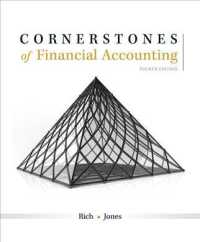- ホーム
- > 洋書
- > 英文書
- > Psychology
Full Description
Revisiting the Classic Studies is a series of texts that introduces readers to the studies in psychology that changed the way we think about core topics in the discipline today. It provokes students to ask more interesting and challenging questions about the field by encouraging a deeper level of engagement both with the details of the studies themselves and with the nature of their contribution.
Edited by leading scholars in their field and written by researchers at the cutting edge of these developments, each book details the original works and their theoretical and empirical impact, and then discusses the ways in which thinking and research has advanced in the years since the studies were conducted.
Political Psychology: Revisiting the Classic Studies examines 17 influential studies that shaped how we understand political attitudes, identity, and behaviour. From Milgram to Sherif, each chapter explores the historical context, impact, and legacy of these works, showing how they continue to inform and challenge contemporary political psychology research.
Contents
An Introduction to Classic Studies in Political Psychology - Hema Preya Selvanathan and Jolanda Jetten
Part 1: Individual Level Processes
Chapter 1. Displaced Aggression: Expanding on Berkowitz and Knurek (1969) - Norman Miller, William C. Pedersen and Isabella Di Lauro
Chapter 2. Polarisation - Charlie R. Crimston
Chapter 3. From Doll Studies to Contemporary Notions of Racial Identity: Implications for Intergroup Relations and Wellbeing - Yasin Koc and Hakan Çakmak
Chapter 4. Voting and political participation - Frank Mols and Jolanda Jetten
Chapter 5. Ideology: Revisiting Converse's Examination of Belief Systems in Mass Publics - Danny Osborne
Part 2: Group processes and intergroup relations
Chapter 6. Revisiting Kipnis's Supervisor Experiment - S. Alexander Haslam and Stephen Reicher
Chapter 7. Sherif: Intergroup Violence and Negative Attitudes - Kevin Durrheim and Yasemin Gülsüm Acar
Chapter 8. Collective Action: Revisiting Wright, Taylor and Moghaddam's Responding to Disadvantaged Group Membership Study - Emma F. Thomas, Anna C. Barron and Lucy H. Bird
Chapter 9. Residential Desegregation and Origins of the Contact Hypothesis: Revisiting Deutsch and Collins' (1951) Psychological Evaluation of a 'Social Experiment' in Interracial Housing - John Dixon, Jie Huang, and Stefania Paolini
Chapter 10. Relative Deprivation: Building upon Walker and Mann's (1987) Interviews with Unemployed Australians - Heather J. Smith and Stephanie McKee
Chapter 11. Revisiting Milgram's obedience studies - Andrew G. Livingstone and Megan E. Birney
Part 3: Societal level processes
Chapter 12. The Rioting Crowds: Revisiting Reicher's Study of the St. Pauls' Riot - Sara Vestergren and Evangelos Ntontis
Chapter 13. Collective Victimhood: Revisiting Kahana, Kahana, Harel and Segal's Study on the Victim as Helper - Johanna Ray Volhardt
Chapter 14. Lipset's Working-Class Authoritarianism - Jasper van Assche
Chapter 15. Reflections on Racial Stereotypes of One Hundred College Students: Katz and Braly (1933) - Keith B. Maddox, Jordan Daley and Diane-Jo Bart-Plange
Chapter 16. Gender Stereotypes and Social Roles: Revisiting the Classic Study of Alice Eagly and Valerie Steffen - Naomi Ellemers and Maike Weiper
Chapter 17. Socio-Economic Status and Inequality - Matthew Easterbrook and Matthias Gobel






